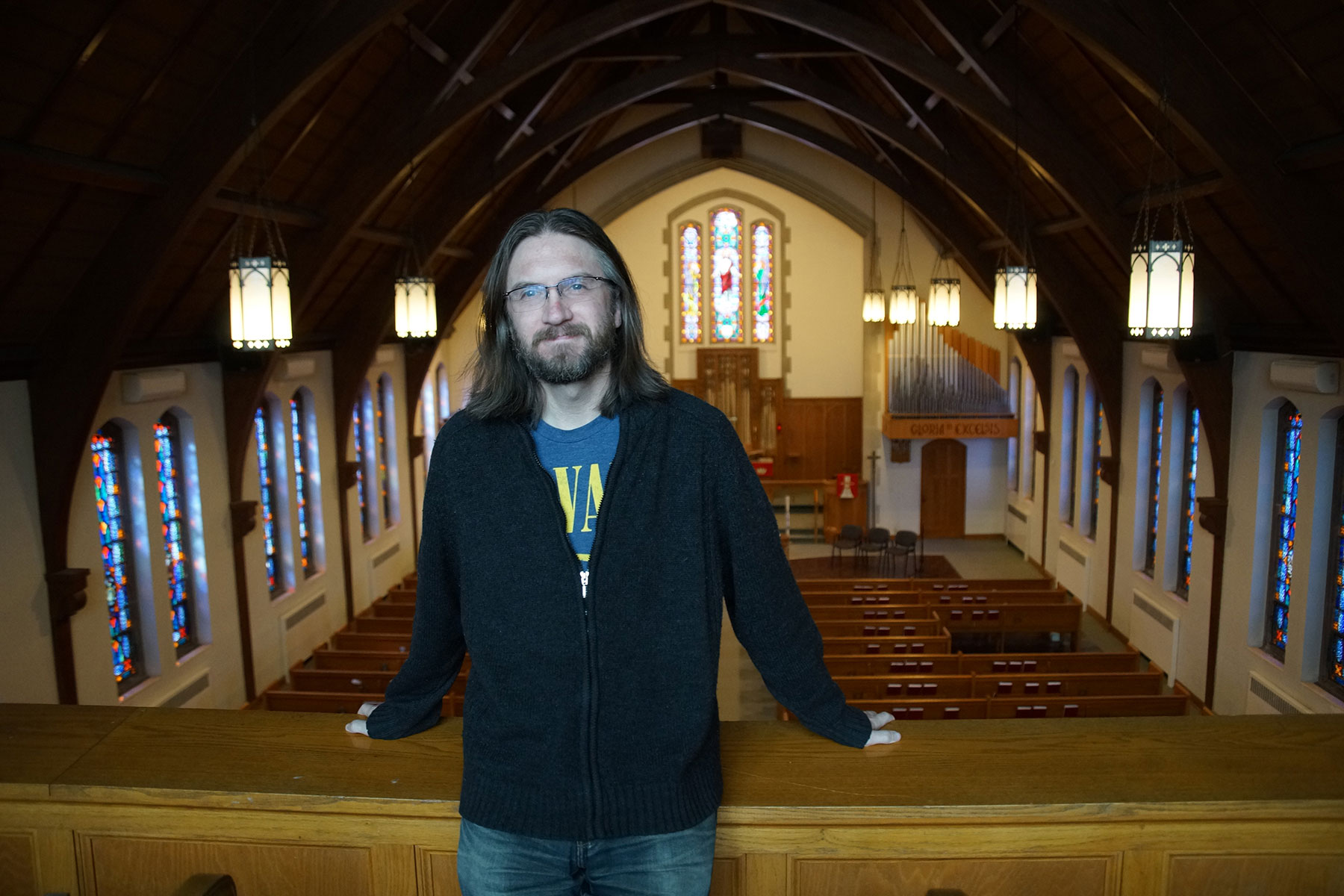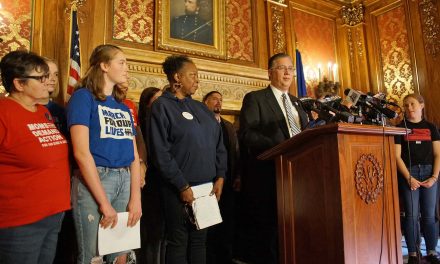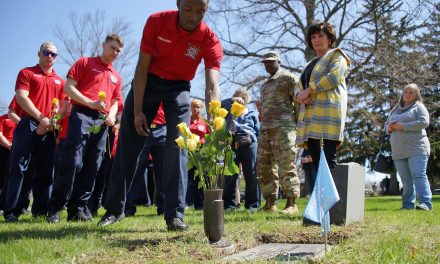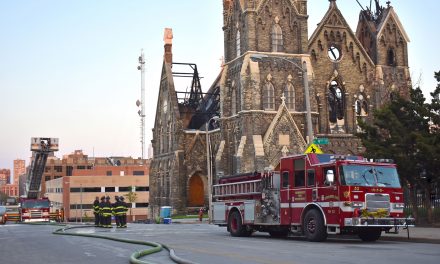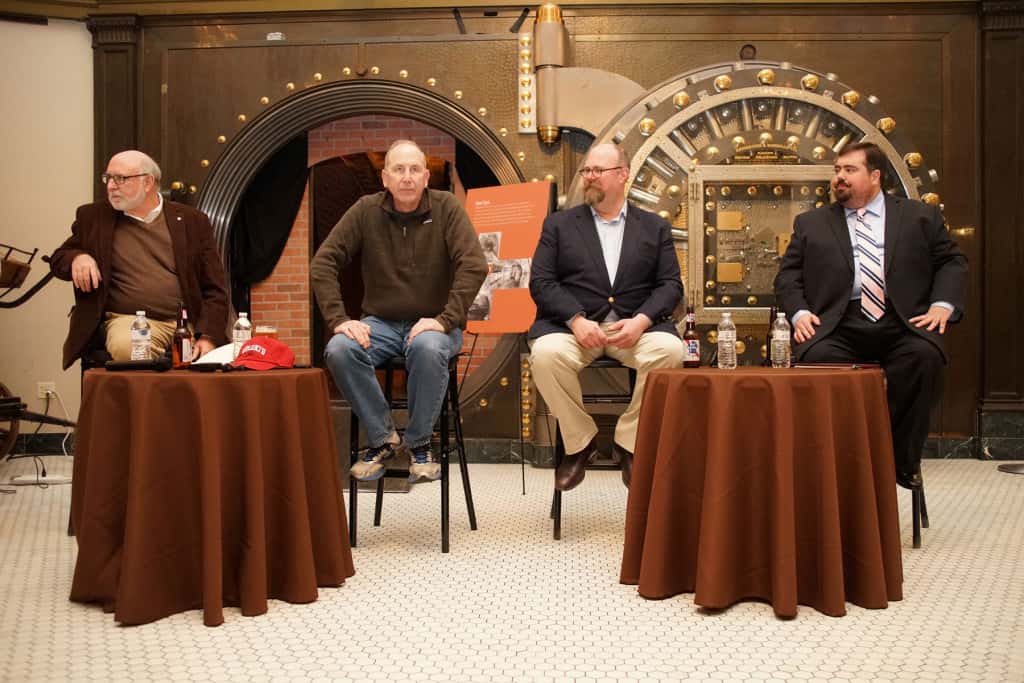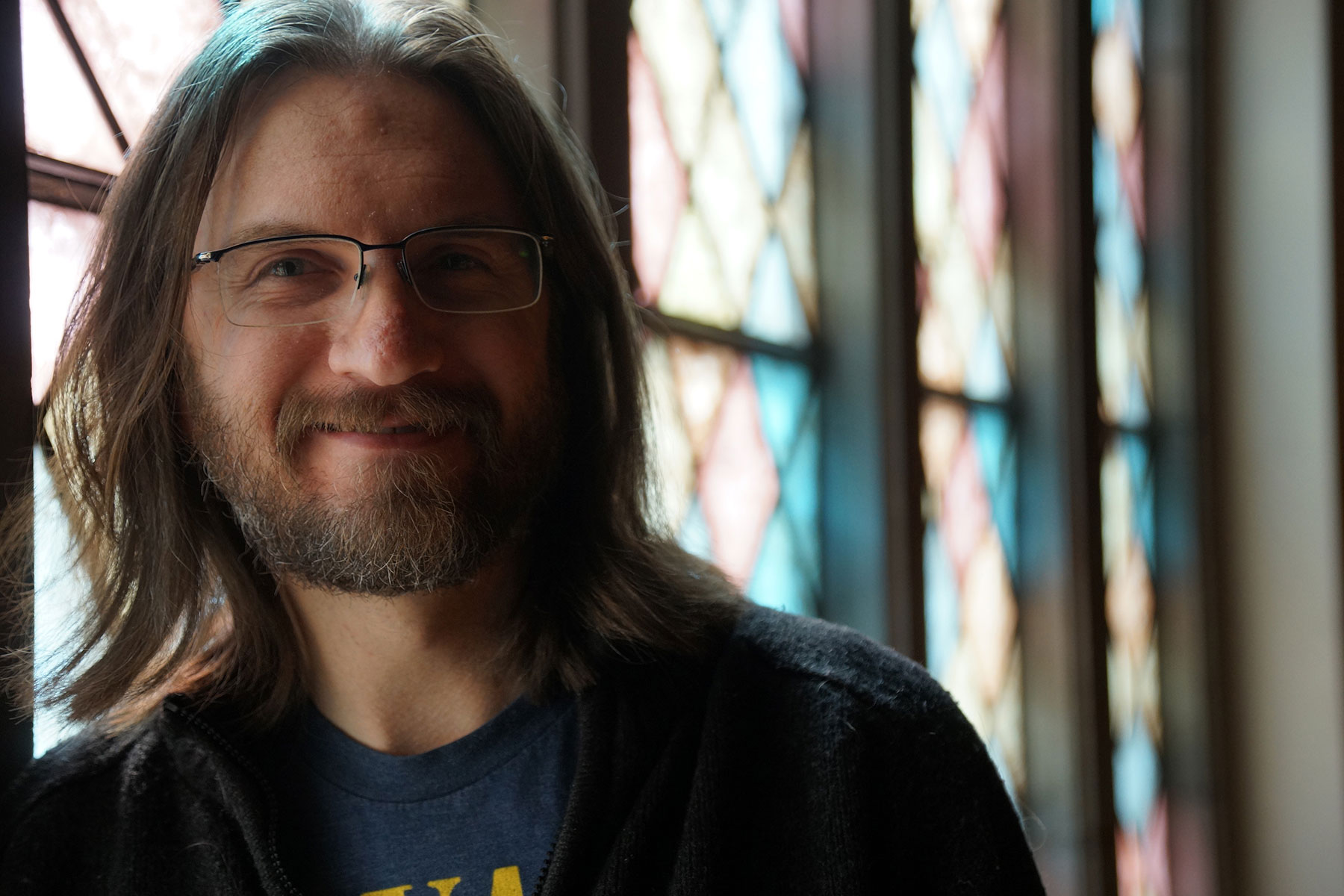
It does not require spending much time with the Pastor of Unity Lutheran Church to realize he is not just doing a job but living out his true calling, a view Kevan Penvose held for his own father’s ministry.
His love for the Bay View community is obvious from the work Penvose does with the homeless and those in need. His desire to treat all people as children of God makes him an unconventional advocate of his faith at a time when institutional religion focuses more on self and idolatry than the words in red on the Gospels pages. Penvose’s spiritual insight and human fragility makes him a much needed voice in Milwaukee, as he speaks truth to power and casts his glowing spirit as an inspiration for others to follow.
Q&A with Kevan Penvose
Milwaukee Independent: Aside from God, who was the most influential person on your early life and why?
Kevan Penvose: So many people greatly influenced me, but if I can only choose one then I’ll have to cheat a bit and choose one couple – my parents. My mom and dad both helped to shape who I am today in their own unique ways. From my mom I received my sense of compassion, my voice for justice, and my knowledge of God’s unconditional love in my life. My dad was a pastor, and an outstanding one at that. He is the kind of pastor you immediately realize is not doing a job but rather living out his true calling. How he influenced me was not in his official capacity as a pastor, but as a dad who lived out his calling seamlessly. I didn’t realize until I was in seminary how much I already knew and understood of what students were learning for the first time. I had simply grown up with deep theological, ethical, and philosophical conversations happening, whether at bed time, at the dinner table, or just goofing around. Through both of my parents I grew up experiencing God’s presence all around me and in each mundane moment.
Milwaukee Independent: What was your path to becoming a pastor, and if you had not joined the clergy what other career direction would you have followed?
Kevan Penvose: I first heard God calling me to be a pastor in my junior year of high school, but the path to accepting that call took several years. At that time, my friends were thinking about life after high school, either getting jobs or going to college and choosing a major. But I could never answer the question of what I wanted to do with my life. Then one morning as I was talking to God on my paper route, I heard the question, “but who are you?” I instantly knew then that God had formed me to be a pastor regardless of professional career options.
And my first reaction was both relief and rejection. I was relieved to have clarity about my future path. But having grown up seeing my dad function as pastor and the stress that involved for him, it was the last thing I ever wanted to do. I spent a lot of time and energy acting out trying to prove to God I shouldn’t be a pastor. When I mustered the courage to tell my dad that God was calling me to be a pastor, I was surprised that his reaction was rather cool and indifferent. He simply told me that I should look for any other option that I could see myself doing and being happy, and if I found it then I should do it; but if I couldn’t see myself being happy doing anything else, then God was likely calling me to be a pastor.
So I started college preparing to be a high school teacher. But after serving one summer as a camp counsellor at a church camp and experiencing a taste of leading people in faith, I returned to school and dropped my education minor, knowing beyond a doubt that the life God had called me to was the only option for me. I no longer needed a safety net or back up plan, which was great for freeing up more time for Frisbee golf.
Milwaukee Independent: What would surprise people to know about you?
Kevan Penvose: I used to have short hair, and I used to play football. I notice that surprises people who see how I look now while wearing a rainbow T-shirt that says, “You can pee next to me.”
Milwaukee Independent: What is the most rewarding part of being a church leader, and is there an aspect of it that is least pleasant for you?
Kevan Penvose: We are living in a historically significant time in which God is renewing the church. Every day I am encouraged when I get to be with people noticing how God transforms their lives. On the other hand, my daily frustration involves the idolatry of institutional religion. As humans, we naturally tend to cling to what is familiar, so we find comfort in our social institutions. There is a part of that, which God uses for good. But it also gets in the way of discovering God’s call over our whole lives, that being a church member isn’t the same as being a disciple of Jesus in our daily lives, that we are called not just to go to church but actually to be the church living on Jesus’ mission in every moment. The greatest joy for me is when people discover how to see what Jesus is doing in the world, do that, and invite others to participate with them.
Milwaukee Independent: What do you enjoy about the Bay View community and how have you seen the area change?
Kevan Penvose: People have lots of opportunity to gather at hang out spots. And most people I know are active in the community. I love meeting and connecting with people who want to serve the community. With the changes in business and residential development, I’m concerned about the people who are being priced out, many who have lived here their entire lives, others who would like to be part of our community but lack the opportunity. Change happens, and with it come both pros and cons. I enjoy listening to people who get pushed to the margins, and then doing what I can to amplify their voices.
Milwaukee Independent: How did the homeless support program begin at Unity Lutheran Church, and what has surprised you the most about it?
Kevan Penvose: Our ministry with campers began in 2003 with a small group of members feeling called to reach out, serve, and welcome people facing various needs in our community. The pastor at that time handed out invitations outside of McDonald’s for people to come and enjoy a meal. The ministry began simply as serving soup once a month to about two dozen people. But it quickly grew in its first year, and needed to expand to weekly meals of various menus with more partner churches and organizations making that possible. What has come from those beginnings, I wouldn’t call a surprise, because people remained faithful to God’s vision. Now the feedback we hear from guests most often reflects two common experiences: one is that the quality of the meal extends dignity to folks; and second is the loving community. The food is an invitation into mutual relationships and friendships that build up the whole community together. This focus on relationships is true of all the outreach ministries Unity has started since the beginnings of the soup kitchen community meal.
Milwaukee Independent: In the medical care process for mental illness conditions, is there any room to use faith as part of the treatment?
Kevan Penvose: I am never shy about telling people that I live with mental illness, because our society needs to get past the stigma often associated with it. My faith is the only way I can navigate the challenges of living with mental illness. I even talk about my faith with my psychologist during my counseling. It’s how the world makes sense to me, and how I see God delivering healing and comfort through the journey of ups and downs, challenges and celebrations. I understand my life as a calling, and I see God guiding me for that purpose through many trials and tribulations, none of which defines who I am as a child of God.
Milwaukee Independent: What is the experience like being a part of an interfaith organization? And do you see Common Ground making the community more whole?
Kevan Penvose: Not all community organizing is the same, but I’m impressed by how Common Ground does it the right way – listening to people about their concerns, nurturing relationships in the community, and empowering us to work together to deliver on solutions. I’ve shared with Keisha Krumm, the Lead Organizer, that when I saw all the people of member organizations gathered into one room, this was the closest image I’ve seen in our city of what heaven looks like. Given our challenges of segregation in our metro area, I’m grateful that Common Ground is intentional in uniting the people of our various neighborhoods into community together.
Milwaukee Independent: Were you involved with interfaith groups when the Oak Creek shooting happened? How did you feel the Milwaukee community responded to that tragedy? And what outcomes have you seen or not seen since?
Kevan Penvose: The people of the Sikh Temple of Wisconsin – Oak Creek have been an inspiration in their continued response to the tragedy inflicted upon them and affecting us all. Instead of fortifying themselves in fear, they have opened their hearts to the community, building bridges instead of walls. Many in our community and even around the world have learned from their example about compassion, forgiveness, and justice. Unfortunately, many others still cling to the idolatry of violence in our society with its temptations to arm ourselves with pre-emptive fear and retribution, which are symptoms of a sickness unto death that inflicts us as humans in society. The work continues of giving witness to God’s love and justice that conquers the powers of death. I have gained encouragement for this endeavor from our neighbors in the Sikh community, from our Muslim friends, from people practicing Judaism and Buddhism, as well as from Christians and other faith communities.
Milwaukee Independent: What is your biggest frustration about efforts to bring social justice to Milwaukee? And what role does complicity by members of the Christian church play in supporting structural racism?
Kevan Penvose: People talk about our silos. We live in isolated social spaces. We have a lot of people who have the initiative and drive, but the challenges are to form relationships beyond our silos and to coordinate our efforts. In this regard, the church’s role in society is no different, or even worse. The challenge of being a Christian is to allow Jesus to shape your life more than we are shaped by the ways of the world. We live in that tension of living in the world while being called to give witness to the in-breaking of God’s reign of reconciliation, justice, harmony, and communion. Unfortunately, the ways of the world condition people as normative, and Christians bring those norms into church. When these norms include structural racism, the result is institutional churches that reinforce sinful structures. If churches aren’t naming segregation and systemic racism in their mission, and don’t have specific plans to dismantle institutional racism – first within themselves and subsequently as a catalyst of transformation throughout society – then not only are we perpetuating the sin, but worse, we falsely sanctify it.
Milwaukee Independent: Faith groups have worked to desegregate Milwaukee for decades, so why has there been so little positive change to show for it?
Kevan Penvose: Lasting change always and only comes from within. We can’t see positive change if we aren’t open to transformation in our hearts. We aren’t open to inward transformation if we don’t confess to God and to one another. Then when we are honest, reconciliation among people requires dismantling structural racism in our social institutions. For faith groups, this process entails commitments to see changes within our leadership and within our worship. As long as the worship time on Sunday morning remains the most segregated time in our society, we will fail to live up to our calling.
Milwaukee Independent: Why do you think younger generations today have not been exposed to the Church in Milwaukee, and what is their view of faith institutions as a result?
Kevan Penvose: Actually, the younger generations have been exposed plenty to the church as social institutions, and to a great extent view the church as complicit in upholding many of the injustices of our society. Churches are faithful when listening to the truth spoken in this critique. The opportunity to engage younger generations then comes in renewing the church as social institution into the church as an authentic community of Jesus’ disciples living life on his mission. I find time and time again that people, who have been hurt by institutional church and people who could care less about institutional church, nevertheless recognize Jesus and respond with joyful hearts when they encounter the presence of Jesus in his disciples.
Milwaukee Independent: What is the most common question you are asked as the leader of a church? What has no one ever asked you? And if you could ask God any question and get an actual answer from Him, what would it be?
Kevan Penvose: I’m commonly asked some version of the question, “how do we save the church?” This may be through questions about finding more members, getting more youth, having more money, and so forth. However it may be worded, the question is the same. The answer is, we don’t. We lose our lives for Jesus’ sake and the sake of his gospel; we take up our crosses and follow him in the hope of resurrection. No one has ever asked me, “how do I lose my life for the sake of the gospel?”
I’d like to ask God how many licks it takes to get to the center of a Tootsie Pop. The world may never know. As a child of the 1980s, this is the question that represents to me unfathomable mystery. And in God, I experience an infinite mystery who wants to be revealed to us, who welcomes us in, and does so in ways that are culturally relevant and not always so serious about ourselves.
Milwaukee Independent: Why are American Christians so intolerant of other religions and non-Americans?
Kevan Penvose: We are products of social conditioning that influences us to put the word ‘American’ as a modifier in front of the word ‘Christian,’ even if only ever subconsciously. Of course one can be both American and Christian, but to be so faithfully demands of us always to see ourselves first as Christian – as followers in the way of Jesus, a first century migrant Jew who was a refugee after his birth, and who insists that we meet him now in serving the lowliest of our sisters and brothers.
Milwaukee Independent: What would you say to a young disadvantaged person interested in serving their life in the church clergy?
Kevan Penvose: Let’s talk!

